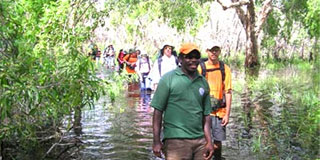Dhimurru: Land and sea management history
Land and sea management history

The relatively intact natural values of the Dhimurru IPA testify to the effectiveness of millennia of sustainable Yolngu management and use without the effects of external pressures for commercial development. Since time immemorial, Yolngu have managed the natural and cultural resources of their land and sea country. They have achieved a balance that has ensured long term, sustainable resource use for the economic and social well-being of the landowners.
The Yolngu were at the forefront of establishing land rights in the Northern Territory and have long fought to have their ownership of their sea country acknowledged under Australian law.
In more recent times, Yolngu lands have been impacted by the activities of the increasing number of miners and their families who had settled in the township of Nhulunbuy since the early 1970s. The permanent presence of a large non-Yolngu population, particularly in the township of Nhulunbuy, required a new response by Yolngu. In 1992, after extensive consultations, Dhimurru Aboriginal Corporation was formally incorporated under the Aboriginal Councils and Associations Act 1976 (Comm).
Dhimurru, in consultation with the Northern Land Council (NLC), set up and manages an access permit system that enables Nhulunbuy residents and tourists to visit designated areas for recreation. Fees raised through sale of access permits help meet the costs of managing the recreation areas, with additional funds contributed by a suite of government and non-government organisations, including Rio Tinto Alcan Gove, owners of the Gove bauxite mine and alumina refinery.
Throughout the 1990s the NT Government sought to enter into a joint management arrangement with traditional owners to establish a national park on Cape Arnhem. However, traditional owners wanted to retain sole management of their lands and repeatedly declined to enter into a joint management arrangement. When the concept of IPAs was developed from 1996, Dhimurru facilitated consultations with each of the clan groups to consider whether this form of protected area would be acceptable to them. A decision was reached to establish the Dhimurru IPA, a management plan was developed, and the IPA was formally declared in 2000.
 In 2006 Dhimurru launched the Dhimurru Yolnguwu Monuk Gapu Wanga Sea Country Plan: A Yolngu Vision and Plan for Sea Country Management in North-East Arnhem Land, Northern Territory (link: 2.2 Meg PDF document). This plan sets out a further vision for Yolngu management of sea country and seeks to build Dhimurru's marine management capacity through its sea rangers and coastal patrol vessel and through the building of partnerships with marine management agencies and marine industries.
In 2006 Dhimurru launched the Dhimurru Yolnguwu Monuk Gapu Wanga Sea Country Plan: A Yolngu Vision and Plan for Sea Country Management in North-East Arnhem Land, Northern Territory (link: 2.2 Meg PDF document). This plan sets out a further vision for Yolngu management of sea country and seeks to build Dhimurru's marine management capacity through its sea rangers and coastal patrol vessel and through the building of partnerships with marine management agencies and marine industries.
In 2007 Dhimurru was successful in gaining funding under the first round of the Commonwealth Government's Working on Country (WoC) program. The Dhimurru WoC involves employment of five Indigenous Rangers and recently expanded to nine with the launch of a Womens (Miyalk) Ranger group, providing a range of essential environmental services in the region. Among these are addressing threats to the endangered Gove Crow Butterfly; research into and management of the yellow crazy ant; participating in marine turtle rescue, recovery and collaborative research; identifying new weed infestations and treating existing infestations; undertaking heritage surveys; conducting fauna and flora surveys; threat abatement planning; and mapping sea grass beds.
Importantly, the Dhimurru IPA offers the opportunity to promote reconciliation and cultural understanding through the interpretation of Yolngu beliefs and values for visitors.
One of Dhimurru's major recent achievements has been the establishment of a women's ranger program, and the integration of the knowledge, skills and understandings of Yolngu women beyond the committee and Wäŋa Wataŋu (traditional owners) and into Dhimurru's operations. In Yolngu culture, both women and men have important roles in caring for country.
Yolngu traditional owners deeply value the opportunity to live on their country in homeland settlements. People on country, living on outstations or homelands has been shown to improve people's health and it can be demonstrated that living on homelands also improves the environmental health of the land and its resources. Dhimurru aims to support rangers to live at homelands and to manage country from remote bases.







